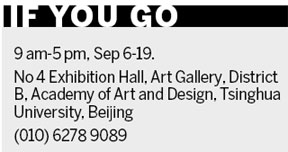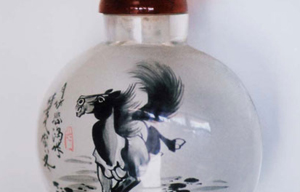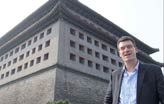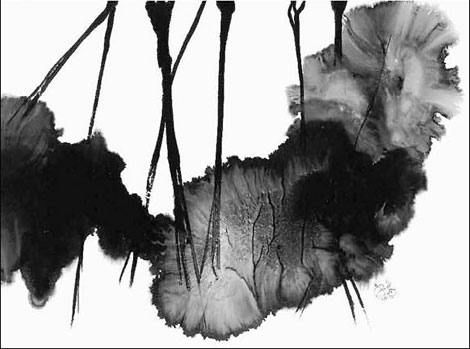Art
Calligraphy or ink wash?
Updated: 2011-09-17 07:39
By Han Bingbin (China Daily)
|
A calligraphy work named Revel by Japanese artist Tokime Nobuko. |
An on-going calligraphy exhibition at Tsinghua University, Cool Japan, showcases the efforts of Japanese artists to make calligraphy a cross-genre art.
On display are works created by 10 Japanese avant-garde calligraphers on over-sized paper. The free-flowing strokes appear to reflect the artists' deep understanding of liu shu, or the six traditional methods by which Chinese characters were invented.
Although the works are based on the shape of the original character, they go beyond it. The ink enters the realm of pictorial expression, making each piece look like an ink-wash painting.
Tsinghua University's art professor, Zhang Fuye, says they express the close connection between characters and paintings, which is a unique quality of Chinese art. These works, he says, will allow people to change the way they view calligraphy.
"It takes us from simply 'reading characters' to 'appreciating art'," he says.
Hang Jian, deputy dean of the Academy of Arts and Design at Tsinghua, sees the works as "a new modern art born out of the open traditions of East Asia". Hang, who helped organize the exhibition, said the works are on the cutting-edge of modern calligraphy and may in fact be seen as a new version of abstract ink-wash painting.
To help viewers understand the works, each comes with a title that aims to explain its artistic meaning, such as Sound of Wind, Early Summer Breeze and Float. According to the curator Okamoto Kyoko, the displayed works are more about feelings than about characters.
 |
When she first came upon these works at the Ishikawa Prefectural Museum of Art in March 2010, she was shocked into silence. She says they reminded her of the inner world of the Japanese and evoked thoughts about the origin of her people.
They express a forgotten part of the Japanese identity, she adds.
Okamoto says she is not sure these works will be accepted as "art" in China, the birthplace of calligraphy.
"I hope to find a positive answer to that question (at the exhibition)," she says.
E-paper

The snuff of dreams
Chinese collectors have discovered the value of beautiful bottles
Perils in relying on building boom
Fast forward to digital age
Bonds that tie China. UK
Specials

Let them eat cake
Cambridge University graduate develops thriving business selling cupcakes

A case is laid to rest
In 1937, a young woman'S body was found in beijing. paul french went searching for her killer

Banking on change
Leading economist says china must transform its growth model soon

